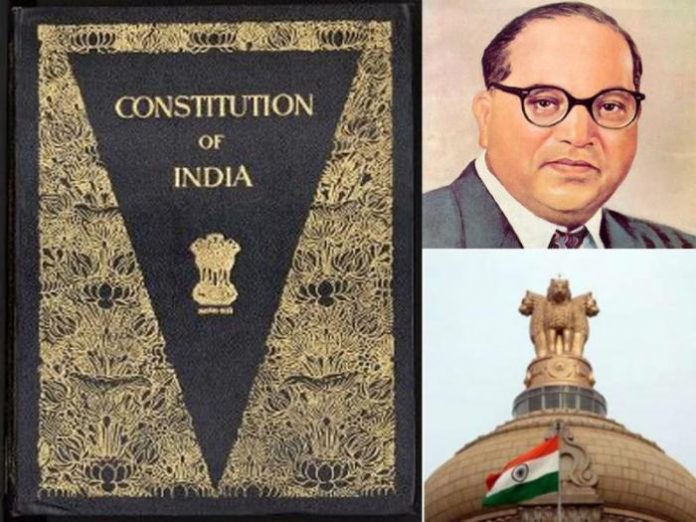MEANING OF DHARMA IN THE EYES OF LAW – [i]
Etymologically Dharma is a Sanskrit word and it has been adopted by most Indian languages with its original meaning. On hearing the word Dharma, religion is the first word that comes to the mind. It is beyond doubt that there cannot be any word that has such a wide and varied meaning and subjected to so much mischief, particularly in political context of India as the word Dharma is concerned where it is mainly referred to as religion. But it shall be explained through this article that the impression Dharma means religion is not a completely correct interpretation and an exploration of getting the proper meaning of Dharma would be undertaken.
In Shrimad Bhagvad Gita, Lord Krishna while conveying the divine knowledge and dispelling the doubts in the mind of Arjuna says the following shloka which is the most cited shloka from Gita –
यदा यदा हि धर्मस्य ग्लानिर्भवति भारत ।
अभ्युत्थानमधर्मस्य तदात्मानं सृजाम्यहम् ॥
परित्राणाय साधूनां विनाशाय च दुष्कृताम् ।
धर्मसंस्थापनार्थाय सम्भवामि युगे युगे ॥[ii]
Meaning that whenever there is decline of Dharma and the rise of ADharma, for preserving of Dharma, Lord takes His divine birth again and again. For the protection of the good, for the destruction of the wicked, and for the establishment of Dharma, Lord comes in being in every age.
The concept and legal connotation of the word Dharma was examined in great detail by a two judges division bench of Supreme Court in the case of A S Deekshitulu vs. State of Andhra Pradesh[iii]. In the judgment itself, it was held that very often the words “religion” and “Dharma” are used to signify one and the same concept or notion; to put it differently, they are used inter-changeable. This, however, is not so, as would become apparent from following portions of this article, regarding our concept of Dharma.
The word Dharma has now been accepted even in English language, as would appear from Webster’s New Collegiate Dictionary which has defined it to mean: “Dharma” : noun, (Sanskrit for dharayati – be holds) akin to Latin word firmus firm : custom or law regarded as duty : the basic principles of cosmic or individual existence : nature : conformity to one’s duty and nature.” The Oxford English Dictionary defines Dharma as : “Right behavior, virtue; the Law (Sanskrit = a decree, custom)”.
Dharma is a Sanskrit expression of widest import. There is no corresponding word in any language. It would also be a futile attempt to give any definition to that word. It can only be explained. For instance, the word Dharma is used to mean justice (Nyay), what is right in a given circumstance, moral, religion, pious or righteous conduct, being helpful to living beings, and things, duty, law and usage or custom having the force of law.
One of the major reasons for the misunderstanding of meaning of the word Dharma and its corresponding word in English language is due to the differences between the Indian and western societies. With the exception of Hinduism, perhaps every other religion has a founder. Hinduism does not have a founder and is also referred to as Sanatana Dharma meaning primeval and eternal. As was observed by the Supreme Court in the case of Sastri Yagnapurushadji vs. Muldas Brudardas Vaishya,[iv] unlike other religions in the world, the Hindu religion does not claim any one prophet; it does not worship any one God; it does not subscribe to any one dogma; it does not believe in any one philosophic concept; it does not follow any one set of religious rites or performances; in fact, it does not appear to satisfy the narrow traditional features of any religion or creed.
Swami Vivekananda had stated religion is based upon faith and belief, and, in most cases, consists only of different sets of theories, and that is the reason why there is difference in form.[v] Religion is that which binds a man with his Cosmos, his creator or super force. A religion undoubtedly has its basis in a system of beliefs and doctrine which are regarded by those who profess religion to be conducive to their spiritual well-being. A religion is not merely an opinion, doctrine or belief. It has outward expression in acts as well. The term religion has also been judicially considered in Commissioner, Hindu Religious Endowments, Madras vs. Lakshmindra Thirtha Swamiar of Sri Shirur Mutt,[vi] where in the following proposition of law have been laid down:
- Religion means “a system of beliefs or doctrines which are regarded by those who profess that religion as conducive to their spiritual well-being
- A religion is not merely an opinion, doctrine or belief. It has its outward expression in acts as
- Religion need not be theistic.
In pluralistic society like India, there are numerous religious groups who practise diverse forms of worship or practise religions, rituals, rites etc.; even among Hindus, different denominations and sects residing within the country or abroad profess different religious faiths, belief, practices. They seek to identify religion with what may in substance be mere facets of religion. It would, therefore, be difficult to devise a definition of religion which would be regarded as applicable to all religions or matters of religious practices. To one class of persons a mere dogma or precept or a doctrine may be pre-dominant in the matter of religion; to others, rituals or ceremonies may be pre-dominant facets of religion; and to yet another class of persons a code of conduct or a mode of life may constitute religion. Even to different persons professing the same religious faith some of the facets of religion may have varying significance. It may not be possible, therefore, to devise a precise definition of universal application as to what is religion and what are matters of religious belief or religious practice.
As it has already been stated, it is very difficult to give a precise definition to Dharma. An exploration into the various facets of Dharma is necessary to arrive at a correct understanding of its meaning. Mahabharata contains a discussion of this topic. On being questioned by Yudhistira about the meaning and scope of Dharma, Bhishma stated it is most difficult to define Dharma. Dharma has been explained to be that which helps the upliftment of living beings. Therefore that which ensures welfare (of living beings) is surely Dharma. The learned Rishis (ascetics) have declared that which sustains is Dhrama.[vii]
Dharma constitutes the foundation of all affairs in the world. People respect one who adheres to Dharma. Dharma insulates (man) against sinful thoughts and actions. Everything in this world is founded on Dharma. Dharma, therefore, is considered supreme.[viii] Dharma is that which is indicated by the Vedas as conducive to the highest good. Madhavacharya, the Minister to Hakka and Bukka, founder kings of Vijayanagar Empire, in his commentary on Parashara Smriti, has briefly and precisely explained the meaning of Dharma as that which sustains and ensures progress and welfare of all in this world and eternal bliss in the other world. The Dharma is promulgated in the form of commands.
The Brihadaranyakopanisad [ix] identified Dharma with Truth, and declared its Supreme status that there is nothing higher than Dharma. Even a very weak man hopes to prevail over a very strong man on the strength of Dharma, just as (he prevails over a wrong-does) with the help of the King. So what is called Dharma is really Truth. Therefore, people say about a man who declares the truth that he is declaring Dharma and about one who declares Dharma they say he speaks the truth.
Therefore, Dharma embraces every type of righteous conduct covering every aspect of life essential for the sustenance and welfare of the individual and the society and includes those rules which guide and enable those who believe in God and heaven to attain moksha (eternal bliss). Rules of Dharma are meant to regulate the individual conduct, in such a way as to restrict the rights, liberty, interest and desires of an individual as regards all matters to the extent necessary in the interest of other individuals, i.e., the society and at the same time making it obligatory for the society to safeguard and protect the individual in all respects through its social and political institutions. Shortly put, Dharma regulates the mutual obligations of individual and the society. Thus, it was stressed that protection of Dharma was in the interest of both the individual and the society and therefore a state of Dharma was required to be always maintained for peaceful co- existence and prosperity of all.
In Manusmriti itself it has been mentioned that there is no act of man which is free from desire; Whatever a man does is a result of desire. Analysing the above verse, Manu states that the force behind every action of a human being is his desire[x] (kama). The natural desires of a man were found to be the desire to have sexual and emotional enjoyment and wealth i.e. material pleasure (artha). The source of all evil actions of human beings was traced to the desire for material pleasure which in turn gave rise to conflict of interests among individuals. Dharma as rules of righteous conduct was evolved as a solution to this eternal problem arising out of natural instinct of man.
Though Dharma is a word of wide meaning as to cover the rules concerning all matters such as spiritual, moral and personal as also civil, criminal and constitutional law, it gives the precise meaning depending upon the context in which it is used. When Dharma is used in the context of duties of the individual and powers of the King (the State), it means constitutional law (rajdharma). Likewise when it is said that Dharmarajya is necessary for the peace and prosperity of the people and for establishing an egalitarian society, the word Dharma in the context of the word rajya only means law, and Dharmarajya means rule of law and not rule of religion or a theocratic State.
Dharma in the context of legal and constitutional history only means vyavahara-Dharma and rajaDharma evolved by the society through the ages which is binding both on the king and the people. Dharma does not force men into virtue but trains them for it. It is not a fixed code of mechanical rules but a living spirit which grows and moves in response to the development of the society. Even the king and the state is a servant of Dharma.
In legal system of ancient India, it was the foremost duty of the king to rule his kingdom in accordance with law and it was called RajDharma. Though Dharma was made enforceable by the political sovereign – the king, it was considered and recognized as superior and binding on that sovereign himself. Thus the kings were given the penultimate authority functioning within the four corners of Dharma, the ultimate authority.[xi]
The necessity of scrupulous practices of Dharma is forcefully expressed by Manu – “Dharmo rakshati rakshitah”, that Dharma protects those who protect it. Those who act in contravention of Dharma get destroyed. Therefore Dharma should not be destroyed so that we may not be destroyed as a consequence thereof.[xii] Every act or conduct which was in disobedience to the rules of Dharma was called Adharma and was declared to be injurious to society and the individual. Further those men who are not on the path of Dharma has been said to have animal existence, which is conveyed by the shloka – ‘Dharmen hinah pashubhi samanah’.
There exist many instances which establish that religion is not the correct meaning of Dharma. In India’s Parliament behind the seat of the Speaker of the Lok Sabha “Dharmachakra Pravartanay” is inscribed, which means for the propagation of the eternal cycle of Dharma. Gandhiji very frequently had expressed his idea of Dharmarajya and Ramrajya. When referring to the above terms, what he stood for was not a theocratic state based on beliefs of a particular religion but the assimilation of values and ideals of running a state capable of doing justice to all. Similarly many members of the Constituent Assembly of India had expressed their idea of Dharma while providing suggestions for framing of constitution.
Further, another important observation should be made on the amendment made to the preamble of the Constitution of India. Through the 42nd Amendment of Constitution, the words “Secular” and “Socialist” were added to the Preamble of the Constitution. And after this change the Preamble of Constitution of India became “Sovereign, Secular, Socialist, Democratic, Republic”. In the authoritative official Hindi translation of the Preamble of the Constitution published by the Law & Justice Ministry of Government of India, which is also a public document, the meaning of the word “Secular” is written as ‟Panthnirpeksh”, rather than “Dharmanirpeksha” which is very often incorrectly quoted in political parlance.
Secularism contains the idea that state should not be patronizing any particular religion but should be giving equal treatment to all religions. The conscious effort by legislature as perceived through the translated text of the preamble again confirms the view that Dharma is not the same as religion. There is a big difference in being “Dharmanirpeksh” and “Panthnirpeksh“. Panth or sect symbolizes devotion towards any specific belief, specific way of prayer and specific form of God but Dharma symbolizes absolute and eternal values which can never change like laws of nature.
Former president of India Dr. S.D. Sharma in his speech at Dr. Zakir Hussain Memorial Lecture delivered at Visva Bharati Shanti Niketan on 29th April, 1989, stated that we in India, however, understand secularism to denote ‘sarva Dharma samabhava‘: an approach of tolerance and understanding of the equality of all religions.
It is in this context that the phrase Dharma Vijayah ‘Victory of Dharma’ could be understood, as employed by the Mauryan Emperor, Ashoka, in his rock edict at Kalsi which proclaimed his achievement in terms of moral and ethical imperatives of Dharma, and exemplified the ancient dictum Yato Dharmastato Jayah (where there is Law, there is Victory).
In the concluding paragraphs of the judgment in A S Deekshitulu vs. State of Andhra Pradesh, the Justice Hansaria had pointed out the difference between Dharma and religion. The difference between religion and Dharma is eloquently manifested when it is remembered that the Supreme Court of India’s precept is “यतो धर्मस्ततो जय:, which conveys the meaning that where Dharma is followed, victory can be achieved there. It is apparent that the word Dharma in this canon or, for that matter, in saying: “धर्मो रक्षति रक्षितः” does not mean religion. In “Chief Justice Gajendragadkar – His Life, Ideas, Papers And Addresses” – by V.D. Mahajan, in Chapter on “Secularism, Its impact On Law And Life In India”, it is stated that law is a secular institution and has to be based on rational and secular considerations. This position is consistent with the real, ancient, pristine view of Hindu law. Dharma, according to the old concept, is a purely secular institution. Dharma is that which sustains the society. Dharma is that by which people at large are held together.
[i] Authored by S Biswas, Advocate, High Court at Calcutta
[ii] Shrimad Bhagvad Gita, chapter IV verse 7 and 8.
[iii] AIR 1996 SC 1765
[iv] AIR 1966 SC 1119
[v] “The Complete Works of Swami Vivekananda“, Vol. I, at page 341
[vi] AIR 1954 SC 282
[vii] Mahabharata, Shanti Parva, 109-9-11
[viii] Taittiriyopanishat – Jnasadhana Nirupam – vide Sasvara Vedamantra p. 128.
[ix] History of Hindu Law by Sarvadhikari, Tagore Law Lectures, 1880, p. 10.
[x] Manusmriti Chapter II, Verse 4
[xi] Justice Rama Jois, “Legal and Constitutional History of India,” Universal Law Publishing Company, 1984 Edition, Reprint of 2008, p. 12
[xii] Manusmriti Chapter VIII, verse 15




































